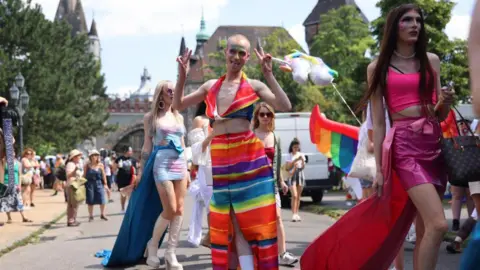The annual Budapest Pride march has found itself at a contentious crossroads as Hungarian police have officially banned the event scheduled for June 28, 2025. This decision has sparked a vehement response from Budapest Mayor Gergely Karacsony, who resolutely announced that the city’s administration would organize the march as planned. This escalation reflects the ongoing tension between the nationalist government of Prime Minister Viktor Orban and the LGBTQ community, with the city police siding with the government to restrict such public gatherings.
The Pride march, a celebration of LGBTQ rights, has come under increasing scrutiny and regulation from the Orban administration, particularly since the Prime Minister openly declared in February that this year’s event would not take place. Following his announcement, a law was passed that effectively limits public gatherings, especially those related to LGBTQ themes, under the guise of child protection. This controversial legislation aims to quell what the government perceives as inappropriate public displays and protect children from exposure to LGBTQ-related messages.
In response to the ban, Mayor Karacsony asserted that the authorities had no legitimate grounds to prohibit what he termed a “Day of Freedom,” an event designated by the city as an umbrella for Pride activities. He emphatically stated that this local event is protected under the laws governing freedom of assembly. Asserting the event’s importance, the mayor suggested that attempts to ban it were as absurd as trying to prohibit a parade of unicorns.
The stakes were raised further with proposals to impose fines ranging from £14 to £420 on individuals identified through facial recognition technology by police, marking a serious threat to personal liberties during the celebration. The Fidesz party’s communications chief, Tamas Menczer, articulated the government’s position, placing child protection above all other legal considerations and labeling the Pride event as an inappropriate festival for familial contexts.
Karacsony’s declaration of a “Day of Freedom” is set to gather tens of thousands of participants, both locals and international supporters, who seek to demonstrate that LGBTQ rights are an intrinsic part of broader human rights. Mayor Karacsony previously rallied with Mate Hegedus, the spokesperson for Budapest Pride, to promote their slate of events intended to circumvent restrictive laws while still celebrating LGBTQ visibility.
Amid this backdrop, the Hungarian Helsinki Committee, a human rights organization, is advising attendees to resist any spontaneous fines that might be issued during the Pride activities. They recommend refusing to pay any fines on the spot, suggesting that those who receive any formal notifications should contest them directly with the police or challenge the authority in court. This strategy aims to not only bolster participation but also create potential backlogs that may deter law enforcement from pursuing punitive actions.
As the organized events approach, questions remain regarding the practicalities of the “Day of Freedom.” The city police have issued justifications for their intent to ban what they claim could be perceived as contradictory to child protection legislation, regardless of the inclusivity of those involved in the procession. With escalating tensions between the local government and nationalist policies from Budapest’s authorities, the outcome of the scheduled event on June 28 is set to play a significant role in the ongoing discourse surrounding LGBTQ rights in Hungary.
The conflict thus is not just a localized issue but serves as a broader representation of the struggle for LGBTQ rights amidst rising nationalism and conservatism in parts of Eastern Europe. As the date approaches, many within the LGBTQ community and its allies remain hopeful that the “Day of Freedom” will mark a pivotal moment for solidarity and rights acknowledgment in Hungary.



